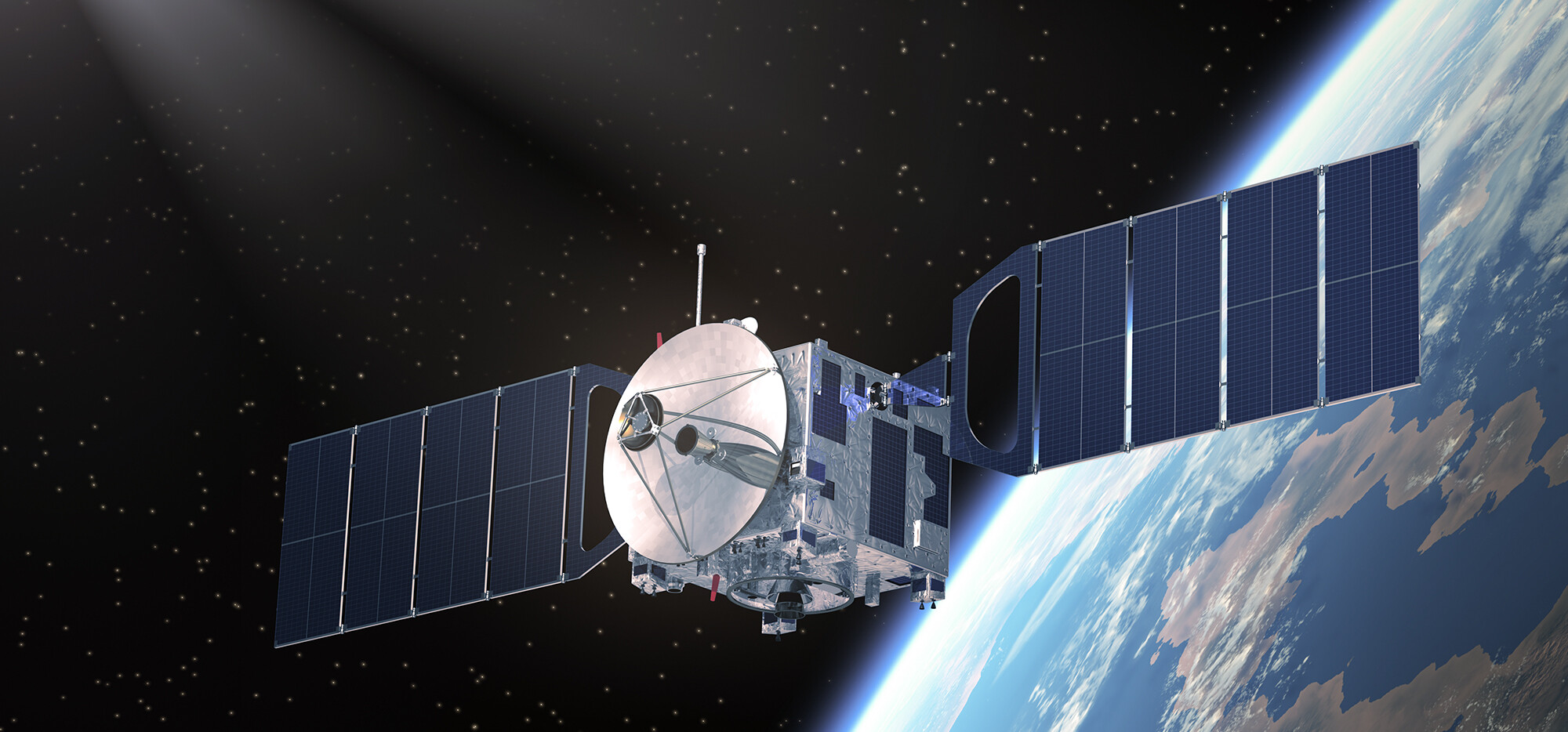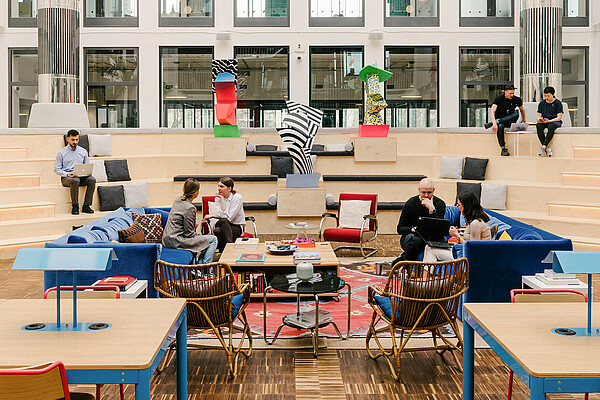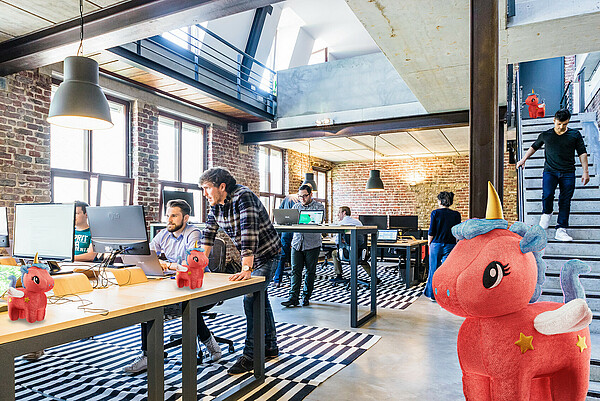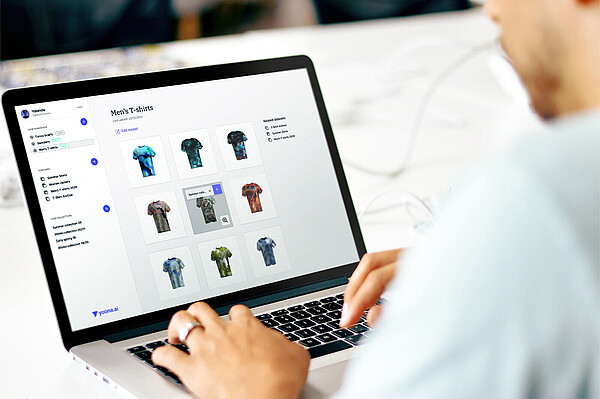The New Space Age
Berlin is Boldly Going Where No City Has Gone Before ...
The stars seem particularly close to Berlin. At least judging by the amount of space-related research and business taking place here. Whether it is looking up into the heavens, or looking down onto Earth from orbit, the new space age is burgeoning in Berlin.
Watching the World from Above
One company making waves is LiveEO, founded in 2017 and funded in 2019. By analysing satellite data, the startup can tell a rail company when a tree has fallen on a track (or is likely to), a pipeline has sprung a leak (or is likely to), or a wall has collapsed (or is in danger of doing so). “Assets monitoring”, they call it. For infrastructure they have long since proved their case, but as befitting a space-age company, LiveEO thinks big. We spoke with co-founder and CEO Sven Przywara.
Thanks for joining us, Sven. I’d like to start with a question about your childhood: When you were a kid, did you look up to the stars and want to go out there, or was it always a dream of yours to look down on the earth from above?
I think like many children I was very, very fascinated with space exploration and I wanted to be an astronaut myself. So when I was in second or third grade with some of my fellow school pupils I was working on a cardboard model of a spacecraft to land on Mars, because the moon was already done with. I had a teacher who was very inspiring when it came to space, so there was my goal already as a child in primary school, yeah.

And you stuck with it. What is it that continues to excite you so much about space?
I think it really comes down that space technology and all the work around it can really help humanity to answer some of the most fundamental questions, such as where do we come from? Where are we going? Are we alone in space? Just playing a small role in answering any of these questions can make a fundamental difference for our human race.
What you've ended up doing in your vocational life is founding an “Earth Observation Company”. So you’re not actually looking for aliens on other planets or in other systems. You’re looking at the world. What is it that you watch exactly?
We started in the infrastructure industry. That’s where we currently have most of our clients. We monitor physical networks, like rail, also electrical networks, pipelines. And we can spot damage or potential damage, thus preventing accidents. But this is the first market, not the only market.
Earth observation right now has so many opportunities and this space is currently completely underutilized. My co-founder Daniel and I wanted to have maximum impact on as many people as possible, a positive impact.
Assets are being monitored and maintained as data across the globe every single day. This satellite data can most probably help in many different use cases. And so we started with the idea of monitoring assets in a range of industries. We want to bring up observational data to enterprise clients independently of the industry.
It makes more sense to analyze satellite data than to send up your own satellite, because why should our satellite be better than the satellite of someone who has the resources, the expertise in building such a complex hardware product?
You say that there’s a lot of data, but to average Joe Bloggs on the street, this data is not available. How do you get to this data, and which satellites do you use?
We use a wide range of different satellite systems, but I have to say here that the Copernicus programme financed by the European Commission has been the enabler of everything we do. This really helped us to get a feeling for satellite data in the first place. But what we do for our customers on a daily basis right now is we combine satellite data from a range of commercial operators from which we buy satellite data. Then we analyse it, sort it and present it to our clients in a form which helps them solve specific problems.
Is your background more technical, or are you the business brains behind all this?
So I would say Daniel and I are both generalists, but I studied business engineering. My co-founder Daniel studied mechanical engineering and aerospace engineering. I focus on the business but we’re very much working in both fields and create the strategy together.
So with your skill sets, you could have done anything, but it’s your passion that took you into space.
I don't know if I could have done anything, but I would say we both started with coding and we both work on our company, but I think he's the better engineer for sure. So it’s good that he's doing that.
You mentioned that you currently serve infrastructure industries and said that's just the beginning. What other industries are you aiming at? What else do you see coming up in the future?
I recently published an article on how different DAX or fortune 500 companies can use data, but really when we look at the history of satellite data and its commercial utilization, there is one big industry which has been using it to a limited extent already for a while, and that is the agricultural sector. There are very obvious use cases such as where do we have to bring out the fertilizer, where can I harvest, right? But since this is such an obvious case, this is a very crowded market. That’s why we are not serving this market, although there are very good reasons why you could work in this sector and it’s why there are a lot of people working in this market.
We focus on asset monitoring, meaning we look at bridges, streets, factories, houses, and upcoming assets such as construction sites, and we help the operators of these assets to do their daily operations more efficiently and more effectively by raising the bottom line.
We’re not so much looking for the outlier that is the exception, but we are trying to improve day-to-day processes. When we reach our goal, which is to monitor 1 billion assets by 2030, we can help a lot of companies globally in improving their day-to-day operations.
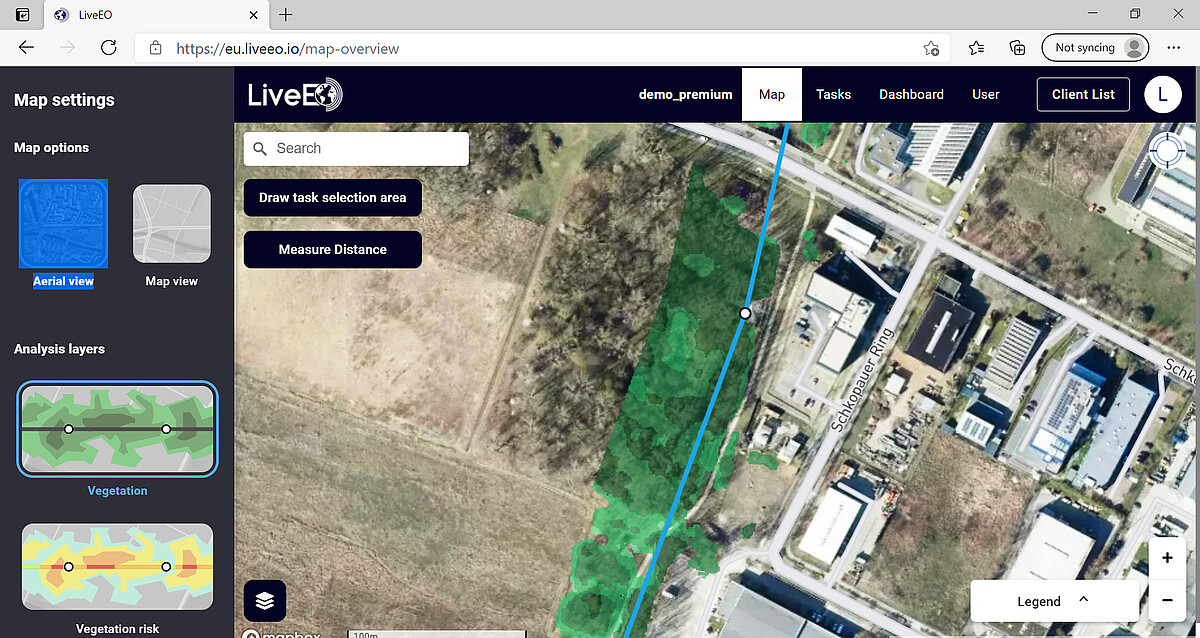
How has your company grown? You only founded in 2017.
Yeah, and now there are 65 of us already. The timing was lucky, and also that we got VC. We didn’t just grow organically. The financing round in 2019 was decisive.
We tried to get help and gain partners wherever we could. And right at the beginning Berlin Partner really helped us to take our first steps, getting from absolutely nothing to something. That was really important at the start. I mean, Daniel and I founded the company right after studying, so we had nothing.
And really important was always developing really close to the customer, and trying to re-invest every bit of revenue and financing into innovation.
You are not the only one who’s using satellite data, obviously. And there are more and more satellites being shot up into space. What do you think of people like Elon Musk and his SpaceX program and Starlink and developments like that?
So first of all I think Elon Musk is a great visionary. There are not that many visionaries with not only the vision but also the capabilities and financial backing to then also execute on it. So that’s very impressive.
SpaceX has really kickstarted a revolution in terms of access to space, which allows a decrease in cost of access to space, and this enables more satellites in space. One of the results is Starlink. Without now commenting on all the ramifications, I think having global connectivity is a good thing.
Also, bringing observation constellations into space can, for example, help us to tackle the effects of climate change. The European Commission just announced a new greenhouse gas monitoring satellite which can help us to better track down where there is emission.
All of this innovation and this entire space sector wouldn’t be possible without, for example, visionaries like Elon Musk, who kickstarted some of the developments in the field.
You mention climate change and environmental issues. One of the big problems is that people on Earth are producing too much junk, and now we’re putting all this stuff into space. How can space junk be prevented?
Yeah, that’s definitely one of the most important challenges the space community has to deal with, like it or not. I mean, it’s a copy of the problem here on Earth, right? Like how do we make sure that we can use space not just today but in twenty, thirty, or fifty years? It’s an important topic which is currently being tackled but which more and more people need to be aware of, because it comes with technology. I think the solution to this problem is also technological.
Better software to know exactly where satellites are to prevent any kind of collisions. Also to actively de-orbit satellites. Bring them down into the atmosphere so that they burn up. It’s a super important topic which needs to be raised every time you speak about launching. You have to think about how you get that thing down again safely.
And there are other difficult issues, surely? If you're watching more and more of what’s going on on Earth, how is that compatible with issues such as data protection and privacy?
Yeah, and this has for example not really been discussed enough and I think it’s an important topic. At LiveEO, we have no interest whatsoever in monitoring individual assets or monitoring individual movements. This is one of our company values which we wrote down and which hangs in the front of our offices. We don’t do surveillance.
We do asset monitoring. We don’t do surveillance, that’s number one. And number two is that we, for example, don’t work in the intelligence or security sector or military sector with satellite data.
Right now the monitoring of private individuals, for example, is limited to an extent due to resolution of the imagery and there is still relatively low frequency of revisit time so that it’s not really feasible to monitor individuals, and that’s a good thing. But in the future, where this will become technologically feasible and economically viable, then there really needs to be a strong mechanism that prevents misuse from happening. But at LiveEO we don’t collect any individual property data without consent. We monitor only industrial assets. The company that pays us is the owner of the assets.
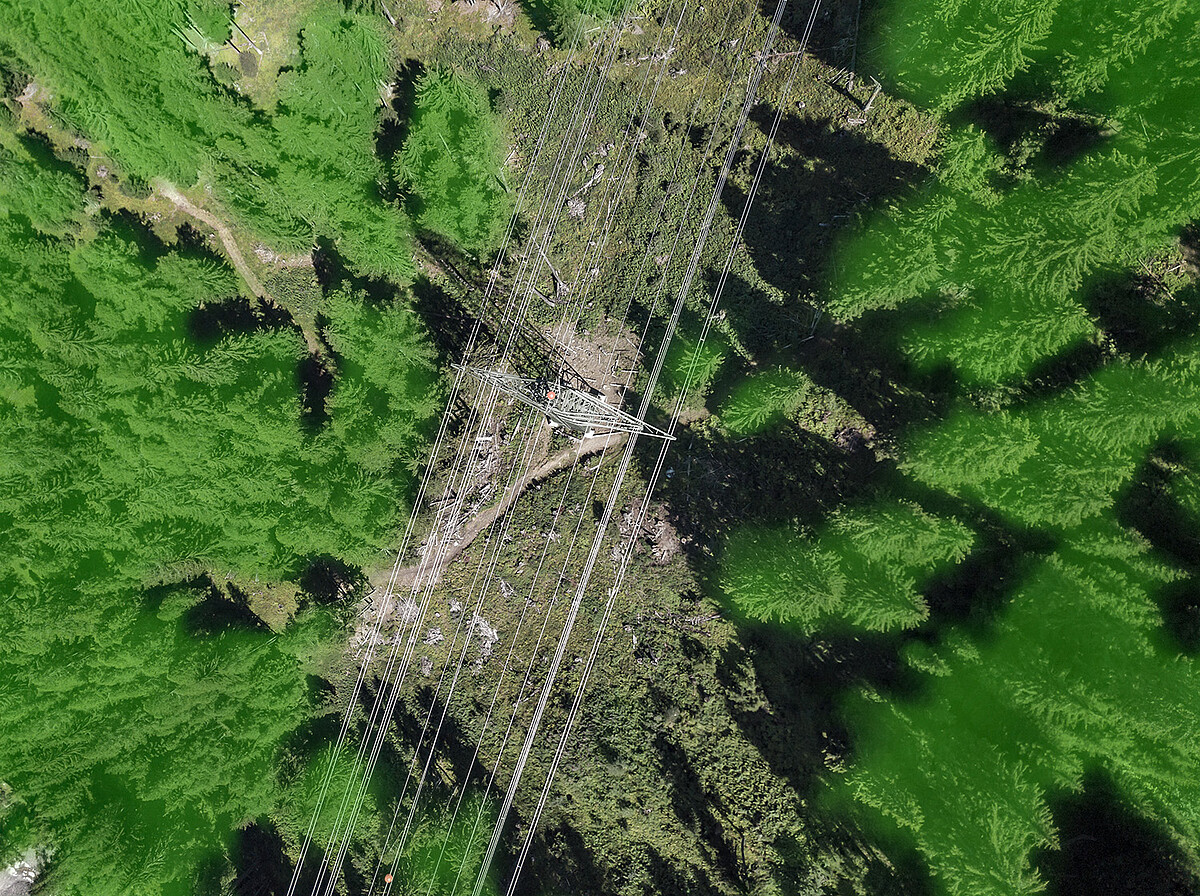
If your startup is very successful and you as founders exit in a few years time and LiveEO is taken over by someone else, you wouldn’t have control over what’s done with the technology that you pushed forward.
Yeah, but in the end, this comes down to corporate governance, right? And I think this is missing in some of the big tech companies from Silicon Valley. If you think about their corporate structure and set-up, such governance is not happening. It needs to come down to the people who run the company and then if there’s an exit to also make sure that the values they tried to infuse into the company don't end with the signature. The technology is already there and it’s already being systematically used to a degree by intelligence organizations.
But we don’t do that. While we’re growing we have to implement a publicly visible and transparent code of conduct which can be validated by external parties.
Founding a startup is no easy matter. But one startup wasn’t enough for you. You’ve also created something else with your collaborator Daniel. Can you tell us about New Space Vision?
Absolutely. New Space Vision was in fact the first thing we did together. I moved to Berlin and started studying business engineering here and then I started working at the space company PTS. That was great, incredible. I mean, there were not a lot of new space startups in this country at the time. Or even on this continent. So it’s cool that I found one.
But I always asked myself, if you talk to children, being an astronaut or doing something in space is one of the most interesting things and biggest kind of job wish a small child would tell you, right? “I want to be an astronaut”. OK, well that vanishes at some point, but I think the fascination with space stays and so I was wondering why isn’t there a bigger kind of networking event for people who are interested in space, so that they can learn from others who have already been successful in the space ecosystem?
An event to help people to maybe start something on their own or with other collaborators. So we initiated NewSpaceVision, a regular networking event where we had speakers from the industry. Daniel and I did this before doing LiveEO and in parallel with doing LiveEO. Now as a live physical event we got hit hard by Corona, obviously. And LiveEO got a lot of traction relatively quickly. So a lot of our focus shifted to towards LiveEO.
But it’s still something we continue doing. We have online events. We have a podcast. And we hope that we can have physical events soon to really bring together the Berlin space ecosystem, which I think is unique globally.
I’d like to go into that a bit more in a minute, but first, “new space” is in your scene a bit of a buzz word or kind of a given already, but perhaps it isn’t out there for the general public yet. What does it mean, “new space”?
Yeah, that's true. We always use these nice keywords which no one else understands, like new space. I think there is no absolute definition of what new space is. But new space for me is applying startup kind of methodologies and approaches typically found in software companies or hardware companies outside of the space industry in the space industry, meaning that I don’t try to have a 12 year long waterfall project management scheme, but rather try to develop a complex system such as a satellite iteratively in sprints. I maybe don’t only aim for customers from the governmental side, but for commercial customers. I don’t only wait for public funding but try to fund my endeavor from private money and I go for venture capital. That I try to implement a lot of software methodologies to minimize the amount of hardware.
All these things in the end drive a quicker innovation cycle in the space industry and this is what new space is for me.
And how has new space been developing on a global scale over the last few years?
It’s a revolution, to me at least. Previously you had a few main players globally. You had Airbus in Europe. You had OHB in Germany. Thales in France. Northrop Grumman and Lockheed and Boeing and whatever in the US. So you had these big players capable of doing big projects.
But because of miniaturization, electronic hardware is getting smaller and you have this new space approach being implemented by a lot of entrepreneurs in the industry. We have now hundreds of companies aiming to launch something into space, developing something for space, writing software for that. When we started with new space vision, you had a handful of pure new space companies, and now it’s really interesting to see how many new space projects are opening up.
There’s a new space incubator here in Berlin. I’m really excited about that because any new space vision in the city is a good thing to have. Now you have a lot of players and you have a real ecosystem building up and just going through that development is really necessary.
How does Berlin fit into all this? How strong is Berlin in this sector? What is so great about Berlin?
I think generally speaking the startup ecosystem, independently of any industry, is great in Berlin. You have a lot of brilliant minds, a lot of international attraction. You have a lot of things going on here outside of space, and I think that’s very important for the new space ecosystem, which thrives on implementing ideas from outside the space sector.
Berlin already has a good SME base in the space ecosystem and a very good university in that field. So there are companies like Berlin Space Technologies, Astro- und Feinwerktechnik Adlershof and a lot of other players which already have lots of capabilities. Because new space is always very collaborative, you don’t do everything on your own. You see what can I do and what can others do better. And so you already have these players which already have a lot of domain expertise which can help, for example be a partner or supplier.
And on the other side you have the Technical University of Berlin which is leading the university ranking in the number of satellites in space. There are few universities globally which have an equal number of satellites in space. And the TU is really deep into the subject, involving a lot of the students in the buildup and operations of these satellites, which I think is a unique kind of human resource to have.
Everyone talks about the most important thing if you start a company is to have the right people in a team, right? If someone in your team makes a mistake operating a satellite then that can be expensive. OK, well here in Berlin you have people who learned how to mitigate this risk during their studies, and this is really unique.
I think Berlin has this more agile approach. More people here have hands-on experience
By the way, there’s an article by Daniel with 10 reasons why Berlin will be the new new space hub.
One last question: Do you think you'll ever go up into space? Will you achieve your dream from primary school?
Yes, I hope so. I believe so. I think not in the next 10 years, maybe not in the next 20 years, but in the next 30 years I think that it will be possible. I’m pretty sure that it will happen in my lifetime. I think there’s going to be a lot of interesting, exciting and maybe a few scary things happening over the next decades, so in my lifetime. Well, I hope that space is going to be one of the fun exercises, yeah?
Interview: Olaf Bryan Wielk, ideenmanufaktur
Header image: © Adobe Stock

